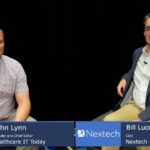Welcome to our Healthcare IT Today Weekly Roundup. Each week, we’ll be providing a look back at the articles we posted and why they’re important to the healthcare IT community. We hope this gives you a chance to catch up on anything you may have missed during the week.
With Data Quality, We’re Still Learning the Lesson Charles Babbage Taught Us in 1821. Two centuries ago, the Englishman introduced the world to the concept of Garbage In, Garbage Out. At HIMSS23, Colin Hung tuned in to a session with Charlie Harp at Clinical Architecture and learned that providers have little trust in the patient data they collect – and even less trust of the data from outside their organization. Read more…
Searching for a New Angle to Address Health Equity. Building on our previous posts on data and health equity and technology and health equity, we asked the Healthcare IT Community to weigh in on how to approach health equity from a different angle. We received recommendations to address health inequity by improving medication management, prior authorization, clinical trials, remote monitoring, patient education, and behavioral health, among other things. Read more…
Exploring Augmented and Virtual Reality Apps for Training. In conversations with Inteleos and Mobiquity, Andy Oram unpacked how VR can simulate health assessments and how AR can train emergency responders for disaster situations. The goal: Train more people in less time so they’re ready for real-life service when they need to be. Read more…
AI Front and Center at 2023 eClinicalWorks Health Centers Summit. Colin summarized the keynote from longtime CEO Girish Navani, highlighting how eClinicalWorks is using AI to power search functions within the EHR, augment tasks such as appointment scheduling, and generate patient summaries – and bring this functionality to community health centers and FQHCs, roughly 60% of which use the eCW platform. Read more…
Better Servicing Patients and Staff at Scale. Healthcare data centers have come a long way in the last five years, VMware’s Michael Robinson told John Lynn. Organizations have embraced the cloud thanks to its improved security, the push for interoperability, the growing number of cloud-ready applications, and of course the shift to remote work. Read more…
To Achieve Success With AI, Focus on the Results. Users care about what AI can do for them; they don’t care as much that AI is what’s doing the task. That was John’s main takeaway from a conversation with Hackensack Meridian Health and H2O.ai. To reach this point, though, an AI product needs to build trust with clinical users. Read more…
Improving Patient and Staff Experience With 5G. Colin chatted with Northeast Georgia Health System about using 5G to make cellular signals available in hard-to-reach places. This has led to improvements to messaging, alert, and alarm workflows, and it has made it easier for patients to maintain connections with the outside world. Read more…
Equity, AI, and EMR Maturity at HIMSS23. Experts from Divurgent and The Ohio State University Wexner Medical Center stopped by the Healthcare IT Today booth to talk about addressing health disparities in underserved communities, as well as moving through the HIMSS EMR Maturity Model and using smart technology in patient rooms. Read more…
Discussing Patient Information Privacy on the Latest CIO Podcast. John spoke to Natalie Pageler, MD, at Stanford Medicine Children’s Health about the unique data privacy challenges that children’s hospitals face. They also highlighted some tips for patients and parents for keeping their health information private when they’re online. Read more…
Supporting the Unique Needs of Small Medical Practices. Separate systems for RCM, practice management, and payments don’t make sense if a medical office has one person managing all things finance. That’s why EverHealth offers bundles of software tailored for the specific needs of small practices, Adam Laskey told Colin. Read more…
The Critical Need for Robust Telemedicine Security. Older remote monitoring devices pose significant security threats because they’re exempt from broader security standards, noted Narinder Singh at LookDeep Health. Auditing vendors, isolating devices, and mandating C-level approval of all exemptions can help organizations safeguard themselves from risk. Read more…
The Analytics of Patient Drop-Off Requires a Closer Look. Given the high cost of specialty drugs, neither providers nor drug manufacturers can afford to lose patients over something so simple as a misplaced call, text or email. That’s why stakeholders need to look at how to optimize the onboarding process, said Yishai Knobel at RxWare. Read more…
Physical Therapy Tech Can Enhance Healthcare Outcomes for All. More than 90% of patients who could benefit from physical therapy don’t have access to it, and PT isn’t immune to healthcare’s workforce shortage. Digital solutions can increase access and improve outcomes, according to Patrick Tarnowski at OneStep – especially if patients don’t need expensive wearables. Read more…
The Transformative Role of AI in Improving Patient Care. Josh Coleman at Treacy & Company by Cherry Bekaert outlined how AI is improving patient charting, remote monitoring, and workflow analysis – all with the aim of helping clinical staff spend more time with patients. Read more…
Featured Health IT Job: Allscripts PM Reporting Specialist, a remote position with Stoltenberg Consulting, posted to Healthcare IT Central.
Bonus Features for May 7, 2023: Less than 1% of all medical claims include an ICD-10 Z code, plus 78% of consumers say virtual health is important when considering health plans. Read more…
Funding and M&A Activity:
- Diagnostic informatics company Clinisys acquired Promium, which provides laboratory information management systems.
- Patient billing communications platform Inbox Health completed a $22.5 million Series B financing round.
- Virtual care platform eVisit acquired Bluestream Health, which manages patient-provider interactions through virtual care processes.
- Tegria acquired Sisu Healthcare IT Solutions, a MEDITECH certified hosting and services firm.
Thanks for reading and be sure to check out our latest Healthcare IT Today Weekly Roundups.













